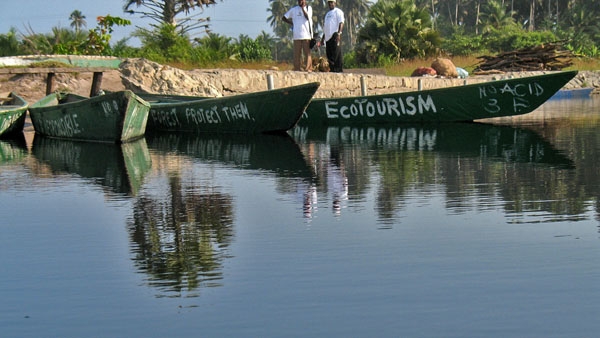Like this article?
Go on, give it a kudu!

Published on June 08 2013
Written by:
Fran
1245 views
Lately, being green is a huge marketing theme but with so much sudden greenness how do we as consumers or clients know whether we are truly contributing to making a difference, or being taken for a green ride? The same uncertainty counts for the travel industry. With the greenwashing of the travel and tourism industry, many travelers find the validity of green tourism uncertain. Between ecotourism, sustainable travel, nature-based tourism, green travel and responsible travel, what is the real deal?
The natural environmental plays a central part in the current being and the future of the travel industry. With the absence of bright city lights but unique wildlife to offer, Africa’s tourism industry relies even more on the natural environment as key tourism resource. Environmental protection should thus be the core value of the tourism industry. But how do we identify whether environmental protection is actually implemented? Through actions that can be identified, measured and valued. Not only words that sound impressive and soothes the environmentally concerned, but real green actions.
It is important to always bear the three over-arching pillars of sustainability in mind: environmental protection, social commitment and economic development. Based on these three concepts, it is possible to determine whether an institution, facility, organization or tour operator is operating on a sustainable (meaning environmental, economic, and social) basis.
To place ecotourism in perspective, we need to return to the well-known Brundtland Commission’s definition of sustainable development as documented in Commission’s Our Common Future. Our environment has a limited ability to meet the world population’s needs – particularly bearing future generations in mind. Therefore, sustainable development strives to “meet the needs of the present generation without compromising the ability of future generations to meet their own needs.” Based on this protocol, Agenda 21 for the Travel and Tourism Industry defines sustainable tourism as “meeting the needs of present tourists and host regions while protecting and enhancing tourism opportunities for the future.”
Ecotourism takes the underlying principles even further. The International Ecotourism Society defines ecotourism as “…responsible travel to natural areas that conserves the environment and improves the well-being of people.” The American Society of Ecotourism refers to a fourfold P-equation: People, Planet, Profit and Progress. Placing this equation in context, the society describes ecotourism as “...purposeful travel to natural areas; to understand the cultural and natural history of the environment; taking care not to alter the integrity of the ecosystem, while producing economic opportunities that make conservation of natural resources beneficial to local people.”
Ecotourism implies tangible contributions to the environment and local community. The term “nature-based tourism” is often propagated, but this is a tourism category; merely involving the traveling and experiencing of places of natural beauty. Ecotourism falls within the category of nature-based tourism, but with the added emphasis of environmental conservation, local community involvement and cultural protection.
Environmental awareness is great, but to qualify for a legit eco-tourism operator or facility, the client or traveler should be able to see the evidence. What environmental protection measures are in place? Is the operator or facility applying resource conservation measures such as rain water harvesting, using of renewable energy, waste minimization, recycling and so forth? As we’ve seen from the underlying principles of ecotourism, authentic eco-tourism extends beyond the natural environment to include culture, socio-economics and community development. To determine whether a tour-operator or tourism facility implies the full extent of ecotourism, check whether the chosen operator makes use of local community members for employment. In what ways is the operator giving back to or supporting the economic activity of the community? One good example of community involvement is community driven green projects or emission reduction projects. These projects have three purposes: (i) economic development for the local community, (ii) environmental education for the local community as well as tourists and (iii) carbon emission reductions.
Environmental conservation and community and culture promotion are long-term goals. Ideally, the tour-operator or facility should have a sustainability and environmental management plan where short, medium and long-term goals towards ecotourism are defined. Again, this makes the goals tangible and easier for implementation and recognition.
Ecotourism certifications and accreditations were slower to develop than the advertising and marketing side of ecotourism. However, most countries today at least have some baseline for ecotourism certification or accreditations. This system allows the tourist to identify and distinguish between authentic ecotourism operators, lodges or facilities, and the ones that are purely taking advantage of the recent eco surges. Certifications can be based on entry-level, mid or advance implementation of ecotourism principles and encourages operators and facilities to continue the journey towards true sustainability and authentic ecotourism. Some examples of sustainable tourism and ecotourism certifications on the African continent include the Fair Trade Tourism Certification (southern Africa), Green Globe (southern Africa and Sub-Sahara Africa), Botswana Ecotourism Certification System, Sustainable Tourism Certification Alliance Africa and Ecotourism Kenya.
Ecotourism experiences are positive and satisfying. Through participating in authentic ecotourism, the traveler will be making a direct contribution to environmental conservation and cultural protection. Be sure to ask your tour operator or facility about how they are doing this! The ecotourism operator or facility should also be in the position to explain to you the environmental and social sensitivity of the host environment. Ultimately, it is all about respect for the environment and its inhabitants.
Photo credits: some rights reserved by longwayround via flickr [Creative Commons]
Sources: The International Ecotourism Society www.ecotourism.org; ETC Africa www.etc-africa.co.za; American Society of Ecotourism www.etourism-usa.com.
Has been on: 11 safaris
Seeing beyond the average tourist routes and experiencing local life is my type of travel! Living in South Africa I'm an environmentalist at heart, and I continue to marvel at the beauty of the African continent.
© Your African Safari Ltd, All rights reserved.
Your African Safari is a safari-planning and safari review site. It was created to help support a healthy African wildlife population. All reviews are vetted before being approved and only ethical tours are published

Using charter flights on your next safari
Published on December 22 2025
By: yourafricansafari.com

Garamba National Park—an anchor of hope in the Democratic Republic of Congo
Published on January 09 2025
By: R.W.

Namibia imposes new visa requirements
Published on July 25 2024
By: yourafricansafari.com